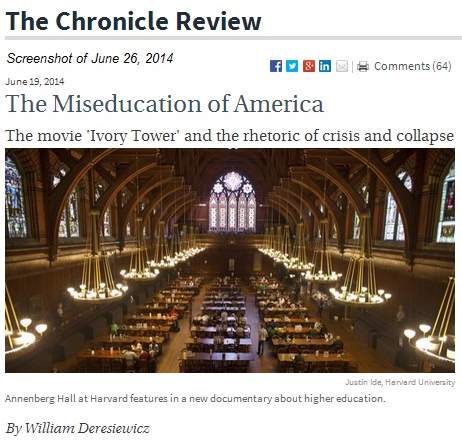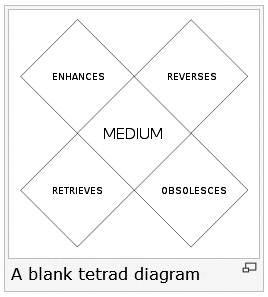
Tuesday, May 14, 2024
Latin Scrabble: Putting the XOR in UXOR
Wednesday, May 1, 2019
The Medium and the Message
In memory of Quentin Fiore — from a Log24 search for McLuhan,
an item related to today's previous post . . .
Related material from Log24 on the above-reported date of death —

See also, from a search for Analogy in this journal . . .
Monday, June 26, 2017
Four Dots
Analogies — “A : B :: C : D” may be read “A is to B as C is to D.”
Gian-Carlo Rota on Heidegger…
“… The universal as is given various names in Heidegger’s writings….
The discovery of the universal as is Heidegger’s contribution to philosophy….
The universal ‘as‘ is the surgence of sense in Man, the shepherd of Being.
The disclosure of the primordial as is the end of a search that began with Plato….
This search comes to its conclusion with Heidegger.”
— “Three Senses of ‘A is B’ in Heideggger,” Ch. 17 in Indiscrete Thoughts
See also Four Dots in this journal.
Some context: McLuhan + Analogy.
Friday, August 19, 2016
Princeton University Press in 1947
From a review, in the context of Hollywood, of a Princeton
University Press book on William Blake from 1947 —

Wednesday, August 10, 2016
Analogies Test
Obituary for Wilford Stanton Miller, author in 1926
of the Miller Analogies Test —

Marshall McLuhan writing to Ezra Pound on Dec. 21, 1948—
"The American mind is not even close to being amenable
to the ideogram principle as yet. The reason is simply this.
America is 100% 18th Century. The 18th century had
chucked out the principle of metaphor and analogy—
the basic fact that as A is to B so is C to D. AB:CD.
It can see AB relations. But relations in four terms are still
verboten. This amounts to deep occultation of nearly all
human thought for the U.S.A.
I am trying to devise a way of stating this difficulty as it exists.
Until stated and publicly recognized for what it is, poetry and
the arts can’t exist in America."
A line for W. S. Miller, taken from "Annie Hall" —
"You know nothing of my work."
Thursday, June 2, 2016
Bullshit Studies
"The allusion to 'the most precious square of sense' shows
Shakespeare doing an almost scholastic demonstration of
the need for a ratio and interplay among the senses as
the very constitution of rationality."
— Marshall McLuhan, The Gutenberg Galaxy ,
University of Toronto Press, 1962, page 13
"What Shakespeare refers to in Lear as the 'precious
square of sense' probably has reference to the traditional
'square of opposition' in logic and to that four-part analogy
of proportionality which is the interplay of sense and reason."
— McLuhan, ibid. , page 241
This is of course nonsense, and, in view of McLuhan's pose
as a defender of the Catholic faith, damned nonsense.
Epigraph by McLuhan —
"The Gutenberg Galaxy develops a mosaic or field
approach to its problems."
I prefer a different "mosaic or field" related to the movable
blocks of Fröbel, not the movable type of Gutenberg.
Sunday, May 29, 2016
The Ideogram Principle …
According to McLuhan
Marshall McLuhan writing to Ezra Pound on Dec. 21, 1948—
"The American mind is not even close to being amenable
to the ideogram principle as yet. The reason is simply this.
America is 100% 18th Century. The 18th century had
chucked out the principle of metaphor and analogy—
the basic fact that as A is to B so is C to D. AB:CD.
It can see AB relations. But relations in four terms are still
verboten. This amounts to deep occultation of nearly all
human thought for the U.S.A.
I am trying to devise a way of stating this difficulty as it exists.
Until stated and publicly recognized for what it is, poetry and
the arts can’t exist in America."
For context, see Cameron McEwen,
"Marshall McLuhan, John Pick, and Gerard Manley Hopkins."
(Renascence , Fall 2011, Vol. 64 Issue 1, 55-76)
A relation in four terms —
A : B :: C : D as Model : Crutch :: Metaphor : Ornament —
See also Dueling Formulas and Symmetry.
Thursday, June 26, 2014
The McLuhan Dimension
"History is a deep and complicated puzzle—
especially when it involves more dimensions than time."
— Introduction to a novella in Analog Science Fiction
"Annenberg Hall" at Harvard was originally part of a memorial for
Civil War dead. Formerly "Alumni Hall," it was renamed in 1996.
Wednesday, May 21, 2014
Through the Vanishing Point*
Marshall McLuhan in "Annie Hall" —
"You know nothing of my work."
Related material —
"I need a photo opportunity
I want a shot at redemption
Don't want to end up a cartoon
In a cartoon graveyard"
— Paul Simon
It was a dark and stormy night…

— Page 180, Logicomix
A photo opportunity for Whitehead
(from Romancing the Cube, April 20, 2011)—
See also Absolute Ambition (Nov. 19, 2010).
* For the title, see Vanishing Point in this journal.
Monday, May 21, 2012
Brightness at Noon
Occultation according to McLuhan
Marshall McLuhan writing to Ezra Pound on Dec. 21, 1948—
"The American mind is not even close to being amenable to the ideogram principle as yet. The reason is simply this. America is 100% 18th Century. The 18th century had chucked out the principle of metaphor and analogy— the basic fact that
I am trying to devise a way of stating this difficulty as it exists. Until stated and publicly recognized for what it is, poetry and the arts can’t exist in America."
For context, see Cameron McEwen, "Marshall McLuhan, John Pick, and Gerard Manley Hopkins." (Renascence , Fall 2011, Vol. 64 Issue 1, 55-76)
Friday, September 16, 2011
Art, Jung, Toronto
Related art—
Midnight's Icons,
and…
(Wikipedia figure)
"Visually, a tetrad can be depicted as
four diamonds forming an X…."
Sunday, August 14, 2011
Sunday Review
The Sunday New York Times today—
This suggests…
The Elusive Small Idea—
Part I:
McLuhan and the Seven Snow Whites

Part II (from "Marshall, Meet Bagger," July 29):
"Time for you to see the field."

For further details, see the 1985 note
"Generating the Octad Generator."
McLuhan was a Toronto Catholic philosopher.
For related views of a Montreal Catholic philosopher,
see the Saturday evening post.
Friday, July 29, 2011
Marshall, Meet Bagger
Marshall McLuhan writing to Ezra Pound on Dec. 21, 1948—
"The American mind is not even close to being amenable to the ideogram principle as yet. The reason is simply this. America is 100% 18th Century. The 18th century had chucked out the principle of metaphor and analogy— the basic fact that as A is to B so is C to D. AB:CD. It can see AB relations. But relations in four terms are still verboten. This amounts to deep occultation of nearly all human thought for the U.S.A.
I am trying to devise a way of stating this difficulty as it exists. Until stated and publicly recognized for what it is, poetry and the arts can’t exist in America."
"Time for you to see the field." —Bagger Vance
The field — See June 2010.
Friday, November 19, 2010
Absolute Ambition
"It's my absolute ambition that you are touched to the core of your being with the content…."
— Julie Taymor on Spider-Man: Turn Off the Dark (Playbill video, undated)
Another ambitious comic-book promotion —
"What Logicomix does that few works in any medium do is to make intellectual passion palpable. That is its greatest strength. And it’s here that its form becomes its substance."
— Judith Roitman, review (pdf, 3.7 MB) of Logicomix: An Epic Search for Truth , in …

The December 2010 AMS Notices cover has excerpts from Logicomix.
Related material:
"In the classical grammarians’ sense of the power of form over 'content' and style over 'substance,' he originated the phrase, 'the medium is the message.'"
— Joseph P. Duggan on Marshall McLuhan at The University Bookman
See also, in this journal, The Medium is the Message, Wechsler, and Blockheads .
Saturday, April 24, 2010
Go Ask Alice
McLuhan in Space by Richard Cavell—
As the word "through" in the title of Through the Vanishing Point □ hints… key reference points for McLuhan and Parker in writing Through the Vanishing Point were the "Alice" books.
[The footnote symbol □ here is mine.]
Alice Rae, McLuhan's Unconscious, doctoral dissertation, School of History and Politics, University of Adelaide, May 2008—
What McLuhan calls the "unconscious"' is more often named by him as Logos, "acoustic space" or the "media environment," and I trace the debts that these concepts owe not only to Freud and Jung, but to Aristotle, St. Thomas Aquinas, gestalt theory, art theory, Henri Bergson, Pierre Teilhard de Chardin, Wyndham Lewis, Siegfried Giedion, Harold Innis, the French symbolist poets of the late nineteenth century and the British modernists of the early twentieth.
The declaration section of the thesis is dated November 19, 2008.
Related material— Halloween 2005 and The Gospel According to Father Hardon.
□ A work suggested by Ander Monson's new Vanishing Point . (See April 17 and April 23, together with the April 22 picture of a non-Euclidean point □ in the context of "The Seventh Symbol.")
Tuesday, March 16, 2010
Gameplayers of the Academy
New Game
In memory of a Jesuit who died on February 22 (see yesterday's "For the Ides of March")–
“The Game in the Ship cannot be approached as a job, a vocation, a career, or a recreation. To the contrary, it is Life and Death itself at work there. In the Inner Game, we call the Game Dhum Welur, the Mind of God."
— M. A. Foster, The Gameplayers of Zan
"… for Othello, no less than his creator Shakespeare, death without speechmaking is almost unthinkable."
— "Walter Ong," by Jeet Heer (Book & Culture, July/August 2004)
"This Jack, joke, poor potsherd, patch, matchwood…."
— Jesuit quote at David Lavery's weblog today
See also this journal on February 22, the date of the Jesuit death. A post on that date mentions Ong and his teacher McLuhan, and displays a McLuhan figure related to the "joke" quote above–
Click figure for background.
Ong discussed "agonistic" culture.
See "Sunday's Theater" and a film
based on the novel discussed there–

Prof. Coleman Silk introduces
freshmen to academic values
For academic gameplayers who prefer
less emotionally challenging subjects,
there is Othello Online —

Monday, February 22, 2010
Annals of Philosophy
The Medium is the Message
From the Wikipedia article
on Marshall McLuhan–
(Click images for some background.)
Related material:
a web page on McLuhan's
student Walter J. Ong, S. J.,
Wednesday, February 4, 2009
Wednesday February 4, 2009
In memory of
James Joyce and of
Patrick McGoohan.
who both died on
a January 13th —


Related material:
The phrase
"Habitat Global Village"
in the previous entry.
Marshall McLuhan was
apparently the originator
of the phrase
"global village."
The phrase, coined by McLuhan,
a Catholic, should be associated
more with Rome than
with Americus, Georgia.
"The association is the idea."
— Ian Lee, The Third Word War

Wednesday, January 28, 2009
Wednesday January 28, 2009
continued from
October 25, 2008
|
"The only wealth he bestowed on his subjects lay in the richness of his descriptive language, the detailed fineness of which won him comparisons with painters like Vermeer and Andrew Wyeth."
— Christopher Lehmann-Haupt in today's International Herald Tribune |
|
"These people have discovered how to turn dreams into reality. They know how to enter their dream realities. They can stay there, live there, perhaps forever."
— Alfred Bester on the inmates of Ward T in his 1953 short story, "Disappearing Act"
Related material:
"Is Nothing Sacred?" |
|
When? Going to dark bed there was a square round Sinbad the Sailor roc's auk's egg in the night of the bed of all the auks of the rocs of Darkinbad the Brightdayler. Where?
— Ulysses, conclusion of Episode 17 |

Happy Feast of
St. Thomas Aquinas.
Sunday, December 31, 2006
Sunday December 31, 2006

St. Thomas Becket’s day–
Thursday, June 26, 2003
Thursday June 26, 2003
ART WARS:
Art at the Vanishing Point
From the web page Art Wars:
"For more on the 'vanishing point,'
or 'point at infinity,' see
Midsummer Eve's Dream."
On Midsummer Eve, June 23, 2003, minimalist artist Fred Sandback killed himself.
Sandback is discussed in The Dia Generation, an April 6, 2003, New York Times Magazine article that is itself discussed at the Art Wars page.
Sandback, who majored in philosophy at Yale, once said that
"Fact and illusion are equivalents."
Two other references that may be relevant:
The Medium is
the Rear View Mirror,
which deals with McLuhan's book Through the Vanishing Point, and a work I cited on Midsummer Eve  …
…
Chapter 5 of Through the Looking Glass:
" 'What is it you want to buy?' the Sheep said at last, looking up for a moment from her knitting.
'I don't quite know yet,' Alice said very gently. 'I should like to look all round me first, if I might.'
'You may look in front of you, and on both sides, if you like,' said the Sheep; 'but you ca'n't look all round you — unless you've got eyes at the back of your head.'
But these, as it happened, Alice had not got: so she contented herself with turning round, looking at the shelves as she came to them.
The shop seemed to be full of all manner of curious things — but the oddest part of it all was that, whenever she looked hard at any shelf, to make out exactly what it had on it, that particular shelf was always quite, empty, though the others round it were crowded as full as they could hold.
'Things flow about so here!' she said at last in a plaintive tone…."


















